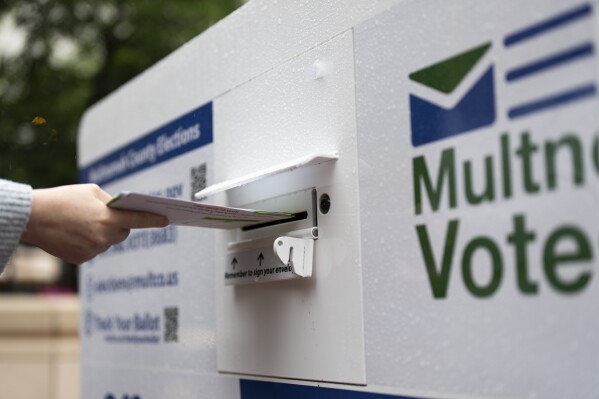Prosecutors in Georgia election case against Trump seek to keep Willis on the case
ATLANTA (AP) — Prosecutors in the Georgia election interference case against Donald Trump, seeking to continue their effort, are asking dismissal of an appeal of a ruling allowing Fulton County District Attorney Fani Willis to continue her prosecution of the former president and others.
In the motion to dismiss filed Wednesday with the Georgia Court of Appeals, prosecutors said there is not sufficient evidence to support reversing the lower court’s order. Trump and eight other defendants in the case are seeking to have Willis and her office removed from the case and to have the case dismissed entirely.
They argue that a romantic relationship Willis had with special prosecutor Nathan Wade resulted in a conflict of interest. Fulton County Superior Court Judge Scott McAfee in March ruled that there was not a conflict that should force Willis off the case, but he said there was an “appearance of impropriety.”
McAfee allowed Willis to remain on the case as long as Wade did not, and the special prosecutor resigned hours later. McAfee also allowed Trump and the other defendants to seek a review of his ruling from the Court of Appeals. That intermediate appeals court last month agreed to take up the case and lawyers for Trump earlier this week asked the court to hear oral arguments.



A Fulton County grand jury in August indicted Trump and 18 others, accusing them of participating in a sprawling scheme to illegally try to overturn the 2020 presidential election in Georgia. Four defendants have pleaded guilty after reaching deals with prosecutors, but Trump and the others have pleaded not guilty.
The case against Trump and the other eight defendants involved in the appeal has been halted by the appeals court while it reviews the lower court ruling. That means the case against Trump, one of four criminal cases against the former president, almost definitely will not proceed to trial before the November general election when Trump is expected to be the Republican nominee for president.
But McAfee wrote in an order earlier this week that he plans to continue handling pretrial motions involving the six defendants who did not join in the effort to disqualify Willis.
Trump and the others argue that Wills improperly benefited from their prosecution because Wade used his earnings from the case to pay for vacations. They also assert that comments Willis made about the case outside of court, particularly a speech at a church right after the allegations of her relationship with Wade surfaced, could unfairly prejudice potential jurors.
In the motion to dismiss, prosecutors wrote that Georgia appeals courts rarely overturn a lower court’s factual findings: “When a trial court makes determinations concerning matters of credibility or evidentiary weight, reviewing courts will not disturb those determinations unless they are flatly incorrect.”
As a result, they argue, there is no basis to reverse the lower court’s ruling in this case, particularly “given the substantial leeway the trial court afforded Appellants in gathering and submitting evidence to support their various theories and arguments.”
As lawyers for Trump and the others tried to prove that Willis and Wade began dating before Wade was hired and that Willis financially benefitted from the case as a result of the romance, intimate details of the two prosecutors’ personal lives were aired in court in mid-February.
McAfee wrote that “reasonable questions” remain about whether Willis and Wade testified truthfully about the timing of their relationship. But he found that there was insufficient evidence that Willis had a personal stake in the prosecution and wrote that he was unable to conclusively determine a timeline for the relationship based on the testimony and evidence presented.
Specifically addressing Willis’ church speech, McAfee didn’t find that it crossed the line to the point that the defendants couldn’t have a fair trial, but he said it was “legally improper.”
Prosecutors argued that with no trial imminent or even scheduled, there is no evidence that potential jurors were tainted by Willis’ comments.
Steve Sadow, Trump’s lead attorney in Georgia, said the motion to dismiss “appears to be a last ditch effort to stop any appellate review of DA Willis’ misconduct” and that prosecutors have “tried this gambit before with no success.”
Disclaimer: The copyright of this article belongs to the original author. Reposting this article is solely for the purpose of information dissemination and does not constitute any investment advice. If there is any infringement, please contact us immediately. We will make corrections or deletions as necessary. Thank you.






